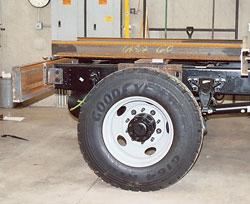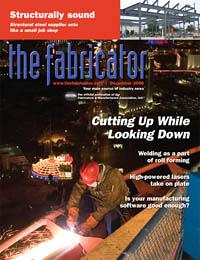Editor-in-Chief
- FMA
- The Fabricator
- FABTECH
- Canadian Metalworking
Categories
- Additive Manufacturing
- Aluminum Welding
- Arc Welding
- Assembly and Joining
- Automation and Robotics
- Bending and Forming
- Consumables
- Cutting and Weld Prep
- Electric Vehicles
- En Español
- Finishing
- Hydroforming
- Laser Cutting
- Laser Welding
- Machining
- Manufacturing Software
- Materials Handling
- Metals/Materials
- Oxyfuel Cutting
- Plasma Cutting
- Power Tools
- Punching and Other Holemaking
- Roll Forming
- Safety
- Sawing
- Shearing
- Shop Management
- Testing and Measuring
- Tube and Pipe Fabrication
- Tube and Pipe Production
- Waterjet Cutting
Industry Directory
Webcasts
Podcasts
FAB 40
Advertise
Subscribe
Account Login
Search
Structurally, it's a job shop
Suburban Steel doesn't operate like a typical structural steel fabricator
- By Dan Davis
- December 12, 2006
- Article
- Shop Management
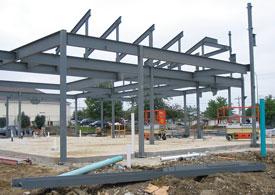
Structural steel from Suburban Steel Co. is used to frame a Huntington Bank branch in Grove City, Ohio.
Structural steel shops can be as inflexible as the giant beams they supply to commercial and residential contractors.
Jobs are booked by the shop hour. More jobs lead to more hours and inevitably longer delivery times. In many instances, just-in-time deliveries in the structural business can be measured with calendars, not stopwatches.
Suburban Steel Supply Co., Gahanna, Ohio, tries not to fall into that traditional trap when servicing its customers. For more than 25 years, the company has tried to meet its customers' needs in the most expedited manner possible—juggling jobs and making the extra effort to meet the customers' requirements.
"It's a job shop mentality, but on a much bigger scale," said Mark DeBellis, Suburban Steel's president.
This structural steel shop is getting bigger as it adds services and expands geographically. The real battle for Suburban Steel now is ensuring the company's can-do attitude is not lost during this growth phase.
No Pipe Dream
Chuck Boster and Bill Jaeger founded Suburban Steel in 1979 in Summit Station, Ohio. The plan called for the duo to jump into the steel pipe business, but because one of them had a 12-month noncompete clause with a previous employer who supplied steel pipe, they decided to concentrate on structural steel for residential applications.
The two saw an opportunity where others saw closed doors. Homebuilders never considered steel because they thought it was hard to get and difficult to work with, unlike the much more prevalent lumber. Framing contractors had concerns about job site problems; a table saw and hammer can't be used to trim off a steel beam that's delivered long.
So Boster and Jaeger started addressing customer concerns. Service trucks with the proper equipment were purchased to assist framing contractors with on-site issues. Equipment was purchased to fabricate the steel for specific job applications, such as cutting to specific lengths or adding holes for bolting requirements. A crane was acquired to assist builders in erecting beams that might weigh as much as 2,000 lbs. An inventory of angles, beams, and channels was kept to allow for next-day delivery on many fabricated items.
"Once we took care of the framing contractor and made it [steel] easy to work with for him, and once we convinced the builder that he could get it when he needed it, guess what?" DeBellis said.
Suburban Steel never got into the steel pipe business.
The company went through a growth phase in the late 1980s when it started serving commercial customers and entered into rebar and miscellaneous steel fabrication. To accommodate the growth, Suburban Steel and its 30 employees moved to Pataskala, Ohio.
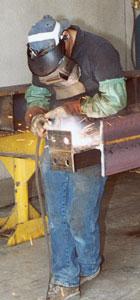
Suburban Steel Supply Co. has 16 large welding areas in its 36,000-sq.-ft. shop. In its previous location in Pataskala, Ohio, the company had room for only three welding tables.
The original owners sold the company to the family-owned Crane Plastics Co. in 1995. Crane Plastics installed DeBellis, then the national sales and marketing manager for Crane's vinyl siding company, as Suburban Steel president. The owners stayed on for roughly two more years to assist with the transition.
"It was a very easy fit for me to inject myself into a service-related business, primarily because of the company I worked for," DeBellis said. "And that's just how I was taught by my dad, who is also a business owner—[understanding] the value of customer service and doing things the right way."
Expanding the Business
The residential business is still the core of Suburban Steel's business. "From 10 pounds to 100 tons, there's no job we won't do residentially," DeBellis said.
For example, Suburban Steel fabricated and erected more than 25 tons of structural steel for construction of a 32-car garage as part of a residential remodel in Fortville, Ind. In one of its more recent large projects, the company contributed more than 70 tons of structural steel for a Michigan home that backs up to the windy shores of Lake Michigan.
From that core customer base, Suburban Steel is now involved in many other areas:
Commercial Construction. When a residential builder asked the company in the late 1980s to supply it structural steel for a commercial construction project, Suburban Steel jumped on the opportunity. The project called for delivery of steel, but on a much larger scale.
Today the company targets commercial projects involving less than 150 tons of structural steel, with the bulk of the jobs falling between 10 tons and 80 tons. The company will accept larger jobs, having fabricated as much as 600 tons of steel for a commercial construction project, but it does not actively seek out these large projects.
Structural Steel Fabrication. To convince residential builders that it could work with steel structural fabrications, Suburban Steel needed the ability to cut to exact lengths, place holes where needed, and join structural shapes together. It needed a full-blown fabricating operation.
In its new Gahanna facility, which the company moved into in January 2005, Suburban Steel has 16 welding tables equipped with Miller Electric Mfg. Co. power supplies for both gas metal arc welding and gas tungsten arc welding processes and portable hand tools for finishing welded fabrications. The company also has drilling, punching, sawing, and shearing equipment to assist in the fabricating chores.
DeBellis admitted that all the equipment is not always in use, but the capacity is needed to ensure they meet customer requirements. He pointed out that the company's Cincinnati shear, capable of cutting 0.5-in. plate as long as 12 ft., can run 24 hours a day, seven days a week, but in reality it's used only for about two hours each work day.
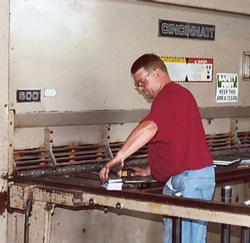
Suburban Steel Supply Co. has 16 large welding areas in its 36,000-sq.-ft. shop. In its previous location in Pataskala, Ohio, the company had room for only three welding tables.
"That's a critical component to provide service on the other end," he said.
Field Erection. For more than 20 years, the company has provided the means to install its fabricated structural steel fabrications. A 23.5-ton boom truck with nearly 100 ft. of main boom is available to help with the task today. In addition, the company offers field measuring and welding and on-site torch cutting.
Miscellaneous/Ornamental Fabrication. In the mid-1990s a customer asked Suburban Steel to supply an ornamental iron railing for a residential project.
"I said yes, without having any idea how to do it," DeBellis said. "But we have a lot of smart people who are smarter than me, and we found ourselves producing simple, little ornamental rails about 2 feet long."
Today the shop fabricates railings and fencing out of aluminum, brass, copper, steel, and stainless steel. The company even had a paint area built in its new facility to handle the painting for many of its ornamental and structural jobs.
Suburban Steel also installs all of its rail and fencing products.
Rebar Fabrication. Again, a customer request led Suburban Steel into this business. The customer had difficulty getting rebar for a commercial construction project.
"Rebar is made of steel. You bend it. You cut it. You detail it. We could do that," DeBellis said. "So we found ourselves in the rebar business."
Supporting all of these fabrication functions is an in-house detailing department where designers take engineered drawings and customer design concepts and prepare erection, structural, and ornamental shop drawings for fabrication and installation. The detailers work in the free-form environment of board drawings and the electronic world of AutoCAD® to prepare the final detail drawings.
Growing Pains?
How does Suburban Steel keep up with the varied projects that work their way through the shop floor? "It's organized chaos," DeBellis said.
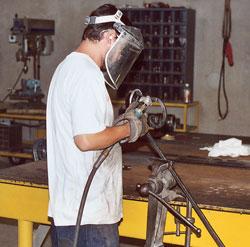
More than 10 years ago, a customer asked Suburban Steel if it could fabricate ornamental railings for a residential project. Today the company designs, bends, and joins individual metal fabrications into interior and exterior rails, driveway gates, and fencing.
In reality, the environment is like a job shop, only on a much larger scale. In fact, the organizational tools Suburban Steel has developed over the years may seem familiar to some sheet metal fabricators as well.
At one time a basket system was used: Orders were written up and placed in a basket, and shop floor personnel figured out the best way to complete the fabricating job. In the mid-1990s a schedule board was implemented, which was an improvement and gave management an idea of the job orders going through the shop at one time. That eventually evolved into a board with magnet tags that could easily be moved around, which eliminated a lot of erasing.
Recently Suburban Steel's first full-time information technology employee developed a scheduling tool using Microsoft Outlook. Anyone with access to the scheduling tool can check on appointments, availability, and status of jobs.
"The next 18 months for us are going to be a critical phase to try to really develop processes we don't have. We do it right now by putting forth our best effort," DeBellis said. "We're trying to get better at it."
The documented processes and performance measurements are necessary as the company grows, according to DeBellis. Almost 100 employees now work for Suburban Steel, and with the added numbers comes a fear that the small company that did whatever was needed to get the job done might become a larger steel fabricator that focuses on the production schedule and not the customer's needs.
"We do them [jobs] right now by effort. Now we want to do them right by process," DeBellis said. "So we're excited about that."
New markets, new opportunities
In March 1997 Suburban Steel Supply Co. acquired D.R. Short Steel Co. in Indianapolis. It marked the company's first expansion beyond its Columbus, Ohio, home market. But sometimes buying a business is a lot simpler than transforming a business.
"We felt we could take an existing business and change its culture, and we learned very quickly that you can't do that," said Mark DeBellis, Suburban Steel's president.
Its Indianapolis acquisition operated mainly in the commercial construction sector and ran its shop according to a strict schedule, often requiring customers to adjust their own requests to meet the scheduled realities of the structural fabricator. Getting the company to adopt a job shop mentality—taking jobs as they come in and doing what it takes to turn them around in the most expedient manner possible—simply did not happen.
DeBellis said in 2002 key personnel changes took place in an attempt to "start over." Suburban Steel also decided to change the company's focus to the residential market. Now the company is working its way back to profitability.
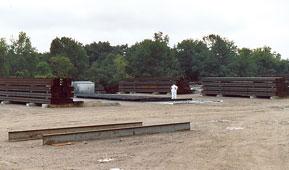
Not too many structural steel fabricators keep a large inventory of angles, beams, and channels in stock, but Suburban Steel believes the inventory allows them to turn around job orders in hours instead of days.
In 2005 Suburban Steel expanded into Louisville, Ky. This time it launched its own office, and the focus right from the start was supplying structural steel for residential buildings.
Based on the success of its most recent expansion, the company is looking to reach out into the Cincinnati and Dayton, Ohio, and Lexington, Ky., markets.
Structurally, that sounds like a good foundation to grow the business.
About the Author

Dan Davis
2135 Point Blvd.
Elgin, IL 60123
815-227-8281
Dan Davis is editor-in-chief of The Fabricator, the industry's most widely circulated metal fabricating magazine, and its sister publications, The Tube & Pipe Journal and The Welder. He has been with the publications since April 2002.
Related Companies
subscribe now

The Fabricator is North America's leading magazine for the metal forming and fabricating industry. The magazine delivers the news, technical articles, and case histories that enable fabricators to do their jobs more efficiently. The Fabricator has served the industry since 1970.
start your free subscription- Stay connected from anywhere

Easily access valuable industry resources now with full access to the digital edition of The Fabricator.

Easily access valuable industry resources now with full access to the digital edition of The Welder.

Easily access valuable industry resources now with full access to the digital edition of The Tube and Pipe Journal.
- Podcasting
- Podcast:
- The Fabricator Podcast
- Published:
- 04/16/2024
- Running Time:
- 63:29
In this episode of The Fabricator Podcast, Caleb Chamberlain, co-founder and CEO of OSH Cut, discusses his company’s...
- Trending Articles
How to set a press brake backgauge manually

Capturing, recording equipment inspection data for FMEA

Tips for creating sheet metal tubes with perforations

Are two heads better than one in fiber laser cutting?

Hypertherm Associates implements Rapyuta Robotics AMRs in warehouse

- Industry Events
16th Annual Safety Conference
- April 30 - May 1, 2024
- Elgin,
Pipe and Tube Conference
- May 21 - 22, 2024
- Omaha, NE
World-Class Roll Forming Workshop
- June 5 - 6, 2024
- Louisville, KY
Advanced Laser Application Workshop
- June 25 - 27, 2024
- Novi, MI
























